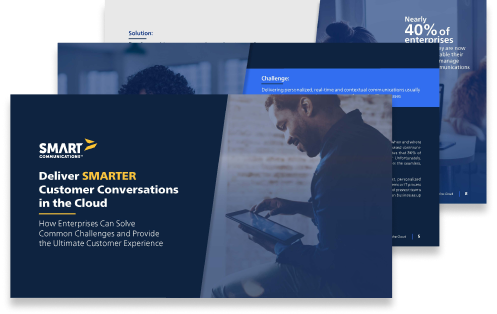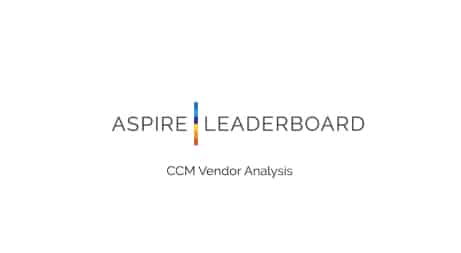The Ultimate Guide to CCM Software provides a high-level overview of this type of software and its capabilities, explains the differences between on-premise and pure cloud solutions, highlights how it fits into an enterprise’s technology stack, poses questions to ask when selecting a vendor and more.
2024 CCM GUIDE: SOFTWARE & SOLUTIONS | SMART COMMUNICATIONS
The Ultimate Guide to CCM Software & Strategic Solutions
Enterprises around the world are navigating both a digital landscape and customer expectations that are changing faster than ever, leading many businesses to rethink how they interact with customers. Instead of one-way, transactional communications, enterprises must now consider two-way, interactive conversations.
Across the insurance, financial services and healthcare industries especially, businesses are interacting with customers at critical moments in their lives. Whether it’s a car accident, an illness or financially planning for a major life event, today’s customers expect seamless, end-to-end experiences.
Unfortunately for many businesses, outdated, legacy CCM systems have created roadblocks and prevented agility, making it even more difficult to meet customers’ growing expectations. Enterprises that adopt pure cloud customer communications management (CCM) software, however, can deliver better customer experiences, and achieve unmatched levels of innovation, agility and scalability.
What is CCM (Customer Communications Management)?
Customer Communications Management (CCM) technology allows enterprises to effectively interact with their customers across a wide range of channels. Gartner defines CCM as “the strategy to improve the creation, delivery, storage and retrieval of outbound communications,” which includes “new product introductions, renewal notifications, claims correspondence and documentation and bill and payment notifications,” among others.
Why is a CCM solution important?
Getting communications right is crucial, as research from Smart Communications revealed that 81% of global consumers consider communications important to their overall experience with a company. The increasing number of communication channels, coupled with customers’ ever-changing expectations, is putting more pressure than ever on enterprises to ensure customer communications are keeping up with the pace of change.
So, how can enterprises set themselves up for success?
A cloud-based CCM solution that enables enterprises to optimize communications and deliver superior customer experiences provides the flexibility and innovation that legacy, on-premise systems cannot. With a focus on increasing productivity, business leaders should take a hard look at investing in technology that prioritizes agility, speed and scale.
BENCHMARK REPORT
How do consumer preferences measure up to business performance?
Find out in our annual benchmark report:
Download
Benefits of Pure Cloud CCM Software
As enterprises weigh their options for customer communications software, they will be faced with on-premise, hybrid cloud and pure cloud solutions.
The best way for companies to meet their customer experience goals in both the near and long term is to invest in cloud-based solutions that optimize customer communications. To succeed, the technology they employ today must be equipped to evolve and scale as customers’ needs and business priorities change over time. Unfortunately, legacy, on-premise tools – or even legacy systems that are now managed in the cloud – were designed simply to distribute outbound communications and as a result have struggled to adapt to the nuances of today’s omnichannel customer.
Unable to provide speed or agility
Little to no business user control
Higher total cost of ownership (TCO)
Suboptimal customer experience
Seamless integrations
Complete view of the customer
Rapid response times
Omnichannel communications
Still need convincing? Below are some of the key benefits of cloud-based CCM software:
EBOOK
Ready to make the move to the cloud?
This ebook explores how large enterprises can efficiently and effectively navigate the CCM migration process.
Download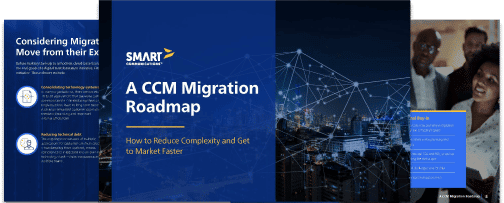
Checklist for Must-have CCM Software Features & Capabilities
When exploring options for CCM software, it’s important to keep several priorities in mind. Everything from integrations to security standards must be top of mind. With that said, below is a checklist of must-have features and capabilities for a modern CCM solution.
Capabilities
Integrations
Integrating a CCM solution with common business applications allows business users to be more agile, efficient and less dependent on IT resources. Enterprises should seek a CCM vendor that provides rapid integrations to common business applications through APIs.
Common technology solution integration partners include:
In addition to technology solutions partners, system integrators provide advisory, managed and implementation services. Top-tier CCM vendors partner with companies like Capgemini, Cognizant, Deloitte and more to provide these services.
Security
Enterprises should seek out a vendor with the most rigorous standards for security and data privacy, including:
Migrating from Legacy CCM Systems to the Cloud
Supporting today’s always-on customer requires digital transformation, and as businesses rethink the technology they use to engage with customers and deliver on their expectations, migrating from legacy CCM systems to the cloud will be critical.
Migration to a cloud-based CCM software can be a significant investment and can feel like a daunting process. Many of the communications that enterprises send are critical in nature and simply cannot be turned off. Whether it’s Explanation of Benefits (EOBs), account statements, regulatory disclosures, fraud alerts or something else entirely, essential messages must get to customers when and where they expect them.
This means that enterprises that are replacing home-grown or legacy applications should prioritize a platform that includes a suite of tools designed to make migration easier. Specifically, business leaders should invest in a solution that extracts more than just content. Migration tools should also carry over styling, layout and more.
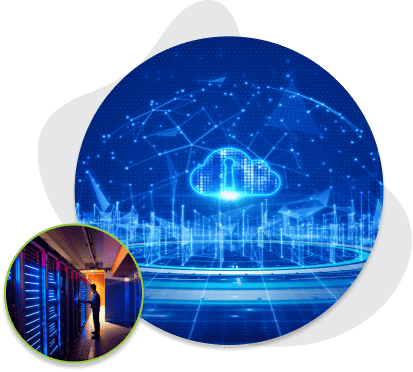
Migration Studio is a suite of tools which reduces the cost, time and complexity inherent with migrations. Migration Studio automates critical components of the migration process by facilitating the conversion of customer output to SmartCOMM™ templates.
Questions to Ask a Potential CCM Solution Provider
Partnering with a particular CCM software provider is a big decision– there are several options available, but not all of them provide the same benefits or level or service. So, when making a purchasing decision, it’s important for enterprises to be thorough and ask thoughtful questions to ensure the CCM vendor they choose is the best fit for their organization’s needs and goals.
- How does the platform scale as business needs change over time?
- How does the solution promote agility within the organization?
- Is the platform built using open standards, micro-services and/or APIs?
- Are there hardware requirements?
- How many customers use a single instance of the application?
- How does the solution handle demand fluctuations?
- Does the platform support industry-specific use cases? Are there successful examples of similar companies using the platform?
- Does the provider offer Service Level Agreements (SLAs)?
- What is the Total Cost of Ownership (TCO) for implementing and maintaining the solution?
- How often is the solution upgraded and what does that process entail?
- How does the solution provider address local regulatory needs and keep data in country of residence?
- How does the vendor address security and data privacy?
- How fast is the implementation process?
- How fast does the solution adapt to new communication channels or other demands?
- How well does the CCM solution integrate with other business-critical solutions?
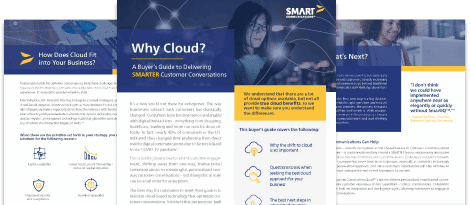
GUIDE
The best way for companies to meet their customer communications goals is to invest in pure-cloud technology that optimizes the end-to-end customer experience.
While there a lot of options available, not all can provide the benefits of a true cloud-based solution. This buyer’s guide covers why the shift to cloud is so important and questions to ask when seeking the best CCM solution.
Download
Tips for Effective Customer Communications Management
Business leaders around the world are challenged with creating exceptional experiences while customers’ expectations are constantly evolving. While this can feel challenging, having the right CCM software in place enables businesses to meet the customer needs of today while also laying the foundation for a successful future.
Below are a few tips for effective CCM that will equip enterprises to deliver exceptional customer experiences and create competitive differentiators.
Today, every customer interaction is an opportunity to shape their overall experience with a company. And with a growing number of communication channels – like SMS, WhatsApp, in-app messaging and more – customers expect to be able to initiate conversations with a business. Unfortunately, many businesses deliver siloed, multichannel communications – where several channels are available but operate separately from each other. This leads to a lack personalization and disjointed customer experiences.
A true omnichannel communications strategy puts the customer – not the business – at the center and orchestrates conversations across channels. Customers can seamlessly move from one channel to the other – providing richer, deeper and more engaging digital experiences.
Recent research indicated that more than 40% of consumers feel that lack of personalization in communications leads to frustration with a company. Providing tailored, personalized interactions leads to a more seamless – and superior – experience.
It’s important to remember that today’s customers expect personalization to go beyond just their name or other demographic data. Enterprises must demonstrate that the data they have is providing an excellent customer experience and is being used in a way that informs future interactions. And, businesses should continue to monitor customer behavior to continuously improve digital experiences and provide meaningful, effective outcomes.
In a world where everyone is always on the go and as technology becomes smarter, faster and more intuitive, the ease and efficiency of digital-first customer experiences can’t be beat. Today, however, being just “digitally available” isn’t enough. Instead, enterprises need to focus on tailoring individual interactions to provide a superior, end-to-end customer experience while also automating processes that allow customers to self-guide where possible. This model also allows customers to initiate interactions any time and from any device.
One-way, transactional messages simply won’t cut it. Today, customers expect personalized, two-way conversations – where data informs future interactions and creates relevant, tailored experiences.
This is where enterprises need to shift from isolated, disjointed transactions to continuous, omnichannel conversations. Effective omnichannel orchestration enables organizations to add digital channels to their print efforts, automate common customer interactions, effectively promote two-way conversations and more. With two-way messaging across multiple digital channels, businesses can strategically orchestrate conversations across the end-to-end customer experience, ensuring that approved, compliant communications are delivered in real time and initiated when the customer demands it.
The only way for enterprises to truly succeed moving forward is to adopt a digital-first approach where customer communications management is the cornerstone of the customer experience. For businesses that already have begun their digital journeys, it’s important to continue to evolve and create more sophisticated digital experiences – maturing and scaling over time.
A cloud-first, end-to-end solution like the Smart Communications Conversation Cloud™, gives businesses complete control over the customer experience, plus the ability to scale. By taking the incremental steps to improve the customer experience via better communications, businesses will see the needle move when it comes to brand loyalty and customer trust.
Why Partner with Smart Communications for CCM
The Smart Communications Conversation Cloud platform delivers personalized, omnichannel conversations across the entire customer experience. Its key capabilities – Collect, Communicate, Collaborate and Coordinate – are built on Integration and Intelligence layers, allowing enterprises to engage in SMARTER customer conversations.
SmartCOMM is a cloud-based CCM software within the Conversation Cloud and enables enterprises to deliver personalized customer communications throughout the entire customer experience. With the enterprise CCM solution, businesses can create and deliver personalized, contextual and compliant communications across customers’ preferred channels at scale.
Businesses who partner with Smart Communications for CCM realize tremendous benefits, including improved business user efficiency, enhanced customer experiences, reduced costs and more.
The success of SmartCOMM would not be possible without strategic partners. Smart Communications connects its customers with technology providers and system integrators to enhance the conversations they deliver to their own customers day in and day out.
Choosing the right CCM software is just one part of the process. Whether it’s migration, implementation or ongoing support, the Smart Communications professional services organization consists of experts ready to meet enterprises where they are in their digital transformation journeys.
Don’t just take it from us! Smart Communications is consistently ranked as a leader in CCM by industry analysts. For enterprises looking to propel their customer communications management strategy, multiple analysts have noted several key capabilities and differentiators, including:
- The only complete, multi-tenant SaaS CCM solution to deliver enterprise-level scalability in the cloud
- Industry-leading integrations
- Cloud-first strategy to reduce reliance on IT
- Leader in workflow and content automation, as well as enterprise-leading investment in the cloud
A Leading CCM Software
Smart Communications was recognized as a leader in Aspire’s most recent leaderboard for customer communications management. Learn more about Smart Communications’ strengths, vision, and more in a complimentary copy of the report.

Enterprise Communications without Enterprise Complexity.
Are you ready to scale the conversation with your customers?

